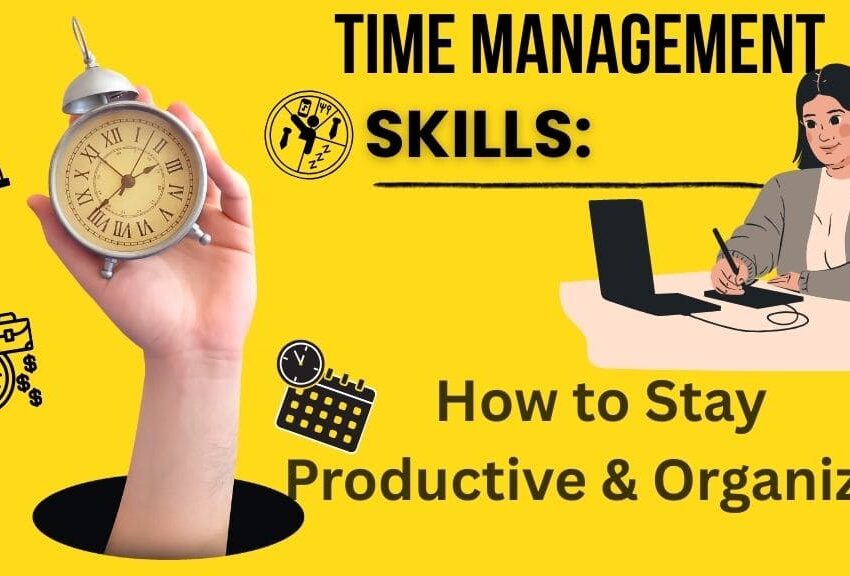
Time Management Skills: How to Stay Productive & Organized
In today’s fast-moving world, time is one of your most valuable assets. Whether you’re a student, a professional, or running your own business, how you manage your time can make or break your productivity—and your peace of mind. The good news? Time management is a skill, not a talent. That means anyone can improve it with the right strategies.
In this post, we’ll break down practical, proven time management skills that help you stay productive, reduce stress, and stay organized every day.
Why Time Management Matters
Before diving into techniques, let’s understand the impact. Poor time management leads to:
-
Missed deadlines
-
High stress levels
-
Lower quality work
-
Burnout and fatigue
Good time management leads to:
-
Higher efficiency and output
-
More free time and flexibility
-
Less stress and better focus
-
A clear path toward your goals
The bottom line? Time management is not about doing more—it’s about doing what matters most, more effectively.
1. Set Clear Goals
Time management begins with goal clarity. You can’t manage your time if you don’t know what you’re aiming to achieve.
Use the SMART Method:
-
Specific – What exactly do you want to accomplish?
-
Measurable – How will you track progress?
-
Achievable – Is it realistic?
-
Relevant – Does it align with your bigger goals?
-
Time-bound – What’s the deadline?
Having well-defined goals gives every hour a purpose.
2. Prioritize Using the Eisenhower Matrix
All tasks are not equal. Prioritizing helps you focus on high-value work.
Try the Eisenhower Matrix:
| Urgent | Not Urgent |
|---|---|
| Important | Do it now (critical tasks) |
| Not Important | Delegate it (if possible) |
This helps you decide what to do first, what to delegate, and what to ignore.
3. Use Time Blocking
One of the most effective time management techniques is time blocking—assigning specific blocks of time to specific tasks.
Here’s how:
-
Block 9–11 AM for deep work (no meetings!)
-
Use 1–2 PM for emails and communication
-
Set aside 4–5 PM for planning and review
This creates structure and reduces task-switching, which kills productivity.
4. Follow the 80/20 Rule (Pareto Principle)
The Pareto Principle states that 80% of results come from 20% of actions. Identify the tasks that bring the most results and prioritize those.
Example:
-
For a student: 20% of study time may bring 80% of exam success.
-
For a freelancer: 20% of clients may bring 80% of income.
Focus on the 20% that matters most, and don’t waste time on low-impact activities.
5. Master the To-Do List (The Right Way)
Not all to-do lists are created equal. A long, chaotic list can be overwhelming.
Pro Tips:
-
Limit yourself to 3–5 key tasks per day (Daily Big 3)
-
Break large tasks into smaller, actionable steps
-
Add deadlines for each item
Combine this with your calendar for extra power.
6. Eliminate Distractions
One of the biggest time-wasters? Distractions.
Common ones include:
-
Smartphones and notifications
-
Social media
-
Constant emails
-
Multitasking
Solutions:
-
Use apps like Forest or Focus Booster
-
Turn off non-essential notifications
-
Set “Do Not Disturb” hours
-
Use the Pomodoro Technique: 25 minutes focused work, 5-minute break
7. Learn to Say “No”
Every “yes” is a “no” to something else. If your schedule is already full, saying yes to new commitments can ruin your focus and stretch you too thin.
Practice polite refusal:
-
“I’d love to help, but my schedule is full right now.”
-
“Can we revisit this next week?”
Respect your own time like you would a client’s or boss’s time.
8. Reflect and Improve
At the end of each day or week, take 10 minutes to ask:
-
What worked well?
-
What didn’t?
-
What should I do differently next time?
This habit of reflection leads to continuous improvement and helps you fine-tune your time management system.
Bonus Tips
-
Use digital tools like Notion, Google Calendar, Trello, or Todoist.
-
Batch similar tasks (like emails, calls, errands) to avoid constant context switching.
-
Plan your day the night before—you’ll wake up with a clear purpose.
-
Take care of your health—sleep, exercise, and nutrition fuel focus and energy.
Final Thoughts
Time management isn’t about squeezing every second out of your day. It’s about making time for what truly matters—your goals, your passions, your people.
By setting clear priorities, staying focused, and using tools and strategies that work for you, you’ll not only get more done, but feel more in control of your life.
Start small. Pick one or two strategies from this post and apply them this week. You’ll be amazed at how much of a difference they make.
Leave a Comment